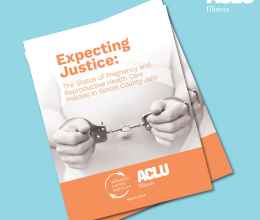The ACLU of Illinois and a number of advocates supporting survivors of domestic violence and opposed to mass incarceration submitted amicus briefs in support of two long-time incarcerated survivors of domestic violence seeking reduced sentences.
For many years neither society nor the legal system recognized or understood the ramifications of surviving domestic violence, and many survivors of violence received harsh sentences for engaging in criminal activity directly related to their experiences of abuse. Our understanding of how domestic violence impacts survivors and the lasting trauma they suffer now has evolved significantly. As a result, policymakers have adopted many reforms to try to ensure that the legal system responds to survivors appropriately. One reform was the addition in 2016 of a provision to Illinois state law that permits a survivor of domestic violence by an intimate partner to petition the court for a new sentencing hearing that takes account of mitigating evidence regarding their experience of abuse that they were unable to present at the time they were originally sentenced for a crime.
This law was intended to address the long history of the legal system misunderstanding and mistreating survivors of domestic violence. But some courts adopted an absurd and unjust interpretation that drastically blunted its impact: that resentencing relief was only available to people who were convicted within two years of when they filed their petitions. This meant that anyone sent to prison before 2014 would be completely out of luck. The people most likely to benefit from the law – those who went to prison decades ago before the development of our modern understandings about domestic violence and its lasting effects – would be left out entirely. In the first 6 and a half years that the law was in effect it was estimated that only 4 survivors were successfully able to petition the courts for a reduced sentence.
The ACLU of Illinois and other organizations sought permission to submit amicus briefs to the Fourth District Appellate Court and then later to the Illinois Supreme Court in support of long-time incarcerated survivors asking for resentencing hearings. The briefs explained the history and transformation of social and legal understandings of domestic violence, and explained how this informs a correct interpretation of the law that includes these two survivors and others in a similar position. Unfortunately the Fourth District refused to consider the amicus brief, but the Illinois Supreme Court did accept the filing.
The other participating organizations who joined one or both briefs were Ascend Justice, Illinois Coalition Against Domestic Violence, Illinois Prison Project, Legal Action Chicago, The Legal Aid Society of Metropolitan Family Services, Life Span, Mujeres Latinas en Acción The Network: Advocating Against Domestic Violence, Shriver Center on Poverty Law, and Women’s Justice Institute.





